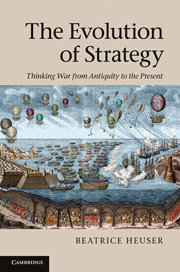Book contents
- Frontmatter
- Contents
- Acknowledgements
- A note on referencing
- Part I Introduction
- PART II Long-term constants
- PART III The Napoleonic paradigm and Total War
- PART IV Naval and maritime Strategy
- PART V Air Power and nuclear Strategy
- PART VI Asymmetric or ‘small’ wars
- PART VII The quest for new paradigms after the World Wars
- 17 Wars without victories, victories without peace
- 18 No end of history: the dialectic continues
- 19 Epilogue: Strategy-making versus bureaucratic politics
- 20 Summaries and conclusions
- Bibliography
- Index
19 - Epilogue: Strategy-making versus bureaucratic politics
from PART VII - The quest for new paradigms after the World Wars
Published online by Cambridge University Press: 05 June 2012
- Frontmatter
- Contents
- Acknowledgements
- A note on referencing
- Part I Introduction
- PART II Long-term constants
- PART III The Napoleonic paradigm and Total War
- PART IV Naval and maritime Strategy
- PART V Air Power and nuclear Strategy
- PART VI Asymmetric or ‘small’ wars
- PART VII The quest for new paradigms after the World Wars
- 17 Wars without victories, victories without peace
- 18 No end of history: the dialectic continues
- 19 Epilogue: Strategy-making versus bureaucratic politics
- 20 Summaries and conclusions
- Bibliography
- Index
Summary
[I]ntramural struggles over policy can consume so much time and attention that dealing with external realities can become secondary.
(Clifford 1991: 93)Where you stand depends on where you sit.
(Miles 1978: 399)Policy and Strategy in practice
If we review the recorded wars of human history, it is rarely, if ever, possible to point to any precise dividing line between politics and the use of armed force as its tool. Much writing about Strategy presupposes that there is none: the ideal for Guibert, Clausewitz and many others was a Strategy-making process in which the supreme political decision-maker was identical with the supreme military commander, in the tradition of Alexander the Great, Gustavus Adolphus, Frederick II of Prussia or Napoleon. Once it became clear that the norm was that the two were not identical, many nineteenth- and early twentieth-century military men, led by Prussian military thinkers, postulated that politics (and diplomacy) had no role to play once war had been declared, and could only resume its functions once war had been ended by victory/defeat or armistice (Lossau 1815: 7). This assumption (which originated in Prussia, but was not confined to it) was largely a function of the contempt in which the age of militarism held politics, politicians, ministers, diplomats and civilians in general. The Second World War would prove a watershed in this respect. Since then, the demands of politics and technical possibilities and limitations of warfare have had too many mutual implications to be seen as separable, particularly when with the spread of democracy, public opinion matters more than ever before.
The one-time strategic adviser and US Secretary of Defense Henry Kissinger, himself a historian of the nineteenth century, wrote in the Cold War:
A separation of strategy and policy can only be achieved to the detriment of both. It causes military power to become identified with the most absolute applications of power and it tempts diplomacy into an over-concern with finesse. Since the difficult problems of national policy are in the area where political, economic, psychological and military factors overlap we should give up the fiction that there is such a thing as ‘purely’ military advice.
Nor did he believe in the existence of ‘purely’ political considerations (Kissinger 1957: 422).
- Type
- Chapter
- Information
- The Evolution of StrategyThinking War from Antiquity to the Present, pp. 488 - 499Publisher: Cambridge University PressPrint publication year: 2010

